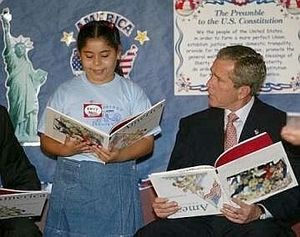UnNews:George W. Bush Children's Library opened
26 April 2013
President George W. Bush has had a children's library dedicated to him in Washington D.C., recognizing his passion for infantile literature.
The George W. Bush Presidential Library, situated near the childcare center at the Southern Methodist University in Dallas, will house the world's biggest collection of children's books, featuring - most controversially - a section of over 1,200 coloring books with no literary value at all.
All five living presidents - not least George Walker Bush who was specially microwaved into animation for the occasion - attended the ceremony, as did former Prime Minister Tony Blair, who is depicted reading a bedtime story to Bush in a portrait above the library's entrance.
President Bush, whose love of a good story was confirmed on September 11, 2001, when he continued reading The Pet Goat to the very end, despite being told a drone passenger plane had crashed into the World Trade Center. "I learned a lot that day," said Bush, when asked to reflect on that defining moment. "Everybody hated that goat because he ate everything all up. Except one little girl. She kept faith in that goat. And at the end of the story, the goat stops a burglar."
An awkward silence ensued, but was finally broken when Bush said, "Now let's check out the library!" a word which he rather sweetly pronounced "lie-berry" throughout the day.
The $260m library was dismissed by one local academic, Joanna Corey, as a “huge, glitzy, glamorous museum of spin,” but cannot be accused of shying away from the difficult questions surrounding Bush's presidency. An interactive feature inside offers young library members snippets of information that Mr Bush received during both 9/11 and Hurricane Katrina and then invites them to decide for themselves whether they want to speak to a grown-up about governmental policy, or read This Is Not My Hat.
Sources[edit | edit source]
- Leverage, "Shock and awe in Dallas as George W Bush’s library mission is accomplished" The Independent, April 26, 2013
- "Video - US presidents gather for library dedication" BBC, April 26, 2013
